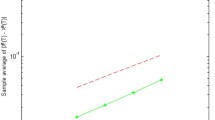Abstract
In this paper stochastic averaging analysis tools are used to study an adaptive time-delay estimation algorithm. Analyzing such an algorithm is very difficult because of its nonlinear, infinite-dimensional, and time-variant nature. By stochastic averaging analysis, we show that for the time-invariant delay case, the adaptive algorithm output converges weakly to the solution of an ordinary differential equation. Local convergence is demonstrated by showing that the solution of this differential equation converges exponentially to the true delay under reasonable initial conditions. Implementation of the algorithm is also discussed. Guided by the averaging results, a modified algorithm is proposed to eliminate the bias of the delay estimation. Second-order analysis is carried out and the results provide a theoretical justification of the observations made by other researchers with simulation and heuristic argument. Computer simulations are also included to support the analysis.
Similar content being viewed by others
References
A. Benveniste, Design of adaptive algorithms for the tracking of time-varying systems,Internat. J. Adaptive Control Signal Process.,1 (1987), 3–29.
G. Carter, Coherence and time delay estimation,Proc. IEEE,75 (1987), 236–255.
D. Etter and S. Stearns, Adaptive estimation of time delays in sampled data systems,IEEE Trans. Acoust. Speech Signal Process.,29 (1981), 582–587.
L. Fu, M. Bodson, and S. Sastry, New stability theorems for averaging and their application to the convergence analysis of adaptive identification and control schemes, inSingular Perturbations and Asymptotic Analysis in Control Systems (P. Kokotovic, A. Bensoussan, and G. Blankenship, eds.), pp. 374–417, Lecture Notes in Control and Information Sciences, vol. 90, Springer-Verlag, New York, 1976.
R. Hamming,Digital Filters, Prentice-Hall, Englewood Cliffs, NJ, 1989.
C. R. Johnson, S. Dasgupta, and W. A. Setheares, Averaging analysis of local stability of a real constant modulus algorithm adaptive filter,IEEE Trans. Acoust. Speech Signal Process.,36 (1988), 900–910.
C. Knapp and G. Carter, The generalized correlation method for estimation of time delay,IEEE Trans. Acoust. Speech Signal Process.,24 (1976), 320–327.
X. Kong, Averaging Analysis of Adaptive Algorithms, Ph.D. Dissertation, The Johns Hopkins University, Baltimore, 1991.
X. Kong, Availability and approximation of signals in adaptive time delay estimation,Proc. 1992 IEEE Internat. Conf. on Acoustics, Speech, and Signal Processing, San Francisco, CA, March 1992, pp. 481–484.
X. Kong and V. Solo, Stochastic averaging analysis of an adaptive time delay estimation algorithm,Proc. 29th IEEE Conf. on Decision and Control, Honolulu, HI, 1990, pp. 3552–3553.
X. Kong and V. Solo, Effects of attenuation factor on adaptive time delay estimation,Proc. 1992 IEEE Internat. Conf. on Acoustics, Speech, and Signal Processing, Toronto, May 1991, pp. 2121–2124.
H. Kushner,Approximation and Weak Convergence Methods for Random Processes, with Applications to Stochastic Systems Theory, MIT Press, Cambridge, MA, 1984.
J. Mason, E. Bai, L. Fu, M. Bodson, and S. Sastry, Analysis of adaptive identifiers in the presence of unmodeled dynamics: Averaging and tuned parameters,IEEE Trans. Automat. Control,33 (1988), 969–979.
V. Solo, The limiting behavior of LMS,IEEE Trans. Acoust. Speech Signal Process.,37 (1989), 1909–1922.
B. Widrow and S. Stearns,Adaptive Signal Processing, Prentice-Hall, Englewood Cliffs, NJ, 1985.
D. Youn and V. Mathews, Adaptive realizations of the maximum likelihood processor for time delay estimation,IEEE Trans. Acoust. Speech Signal Process.,32 (1984), 938–940.
Author information
Authors and Affiliations
Rights and permissions
About this article
Cite this article
Kong, X., Solo, V. Stochastic averaging analysis of a steepest-descent-type adaptive time-delay estimation algorithm. Math. Control Signal Systems 7, 121–147 (1994). https://doi.org/10.1007/BF01211470
Received:
Revised:
Issue Date:
DOI: https://doi.org/10.1007/BF01211470




